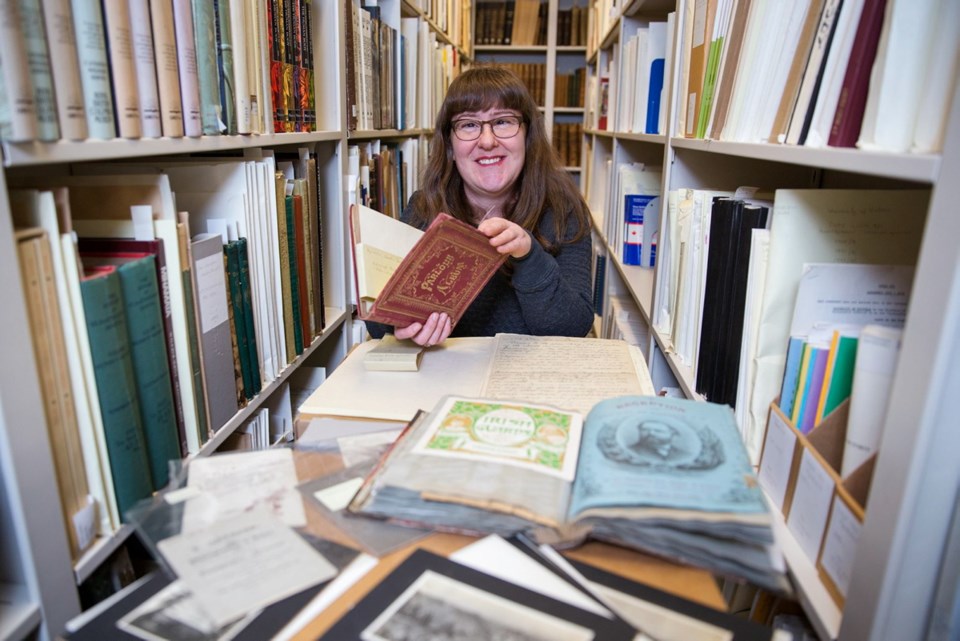When Victoria descendants of the Sylvester family looked through family mementoes and pictures, there was always a sense they were too important to just toss away.
“It was some generations removed from the original Sylvesters,” said Lara Wilson, archivist and director of special collections at the University of Victoria.
“But the family always had an awareness that the material should be accessible to students and to members of the wider community,” Wilson said.
So, what were once boxes of family letters, pictures, documents and scrapbooks scattered among subsequent generations was gathered and donated to UVic. University archivists then sorted it, catalogued it and arranged it in folder boxes.
It now forms a small collection of original documents and other material detailing histories of the Sylvester family. It begins with Frank and Cecilia, who arrived in Victoria to stay in 1863.
It was a time when the Fraser River goldfields were luring thousands. But the Sylvesters eventually chose Victoria and began the foundation of a prominent family, active in business, local politics and the community.
“We don’t just want the stories of the famous people,” said Jane Morrison, UVic associate archivist. “We want the stories of the regular people to show what their lives were like.”
Morrison, Wilson and fellow UVic archivist Heather Dean will be part of Ideafest for an event called Archives in Your Attic. People are invited to bring in one or two items (and items are not boxes) for the archivists to judge their historical significance.
They could be letters, cards, photographs, business licences, property transfer deeds or scrapbooks, old home movies or family videos.
People are also invited to bring in what they think might be an old or rare book. The archivists will do their best to look it up to figure out if it’s a first printing or a rare edition.
Whatever it is, archivists will have a look, provide an assessment of its historical worth and maybe recommend a suitable archive if donation is on the person’s mind.
The event will operate in the way antique appraisers will put on public events to give people an idea of the provenance and monetary worth of a particular object. But at Ideafest, the archivist will pass judgment on an item’s historical, not financial, worth.
These items are often stored away in family homes. Often nobody knows what they are or who they depict. On the other hand, the families often sense they might be of interest or importance to someone. So they are reluctant to throw them out.
“Oftentimes a family member dies and the survivors are just overwhelmed with dealing with estates and so forth,” said Wilson.
“But if they think something is important, they could contact an archivist,” she said.
Morrison said documents don’t have to be of great age. For example, home movies or home videos might be worthy of preservation.
She noted UVic has a growing collection of items from the 1960s, ’70s, ’80s and ’90s dealing with the local women’s movement.
The archivists will discuss and give some tips on how to conduct research and the importance of primary sources.
They can offer advice on how to store, label and catalogue documents at home. Old pictures, for example, are so much more valuable to history when somebody just takes the time to pencil in a name and date on the back.
Genealogists, people who trace family histories, are often big users of archives. People interested in their own family trees can get a little advice on getting started.
Also, with so many people now taking only digital pictures, the archivists will offer ideas on how to store and catalogue the images digitally. That way, they are not lost when a cellular telephone wears out.
Most importantly, the last thing people should do is assume something has no significance and toss it out.
For example, Morrison said, UVic archivists recently heard a story of a longtime Victoria architectural firm sending all its old drawings to the dump. The documents could have been valuable to anyone interested in the historical development of Victoria.
“If people think something is significant, they should contact an archive or at the least, call their local library,” said Wilson.
“Archivists and librarians are pretty much always willing and able to go to somebody’s house, look and maybe take some boxes away,” said Morrison.
Archives in Your Attic is on Saturday, March 11, 12:30 p.m. to 2 p.m. at the McPherson Library, A003.



